Imagining the new normal: The great organizational overhaul

‘In the face of overwhelming odds, I'm left with only one option, I'm gonna have to science the s*** out of this.’- The Martian
While we as a human race are doing our best to science the s*** out of the Coronavirus, it’s a fact that the virus has led to a major overhaul of all our systems-be it life or work. If there is one area that the COVID-19 crisis has fast-tracked in HR and the world of work and is leading to a major shakeup, it is the adoption of HR tech and digital technology. Organizations are scrambling to revamp themselves and their businesses digitally as the crisis makes it imperative for them to fall back on technology to deliver when social distancing and WFH has become the norm.
In a survey carried out by HR tech firm HONO.ai spanning 2,000 geographically spread participants, 47% stated that HR Tech will enable businesses post COVID-19 while 22% believe it will have a strong influence.
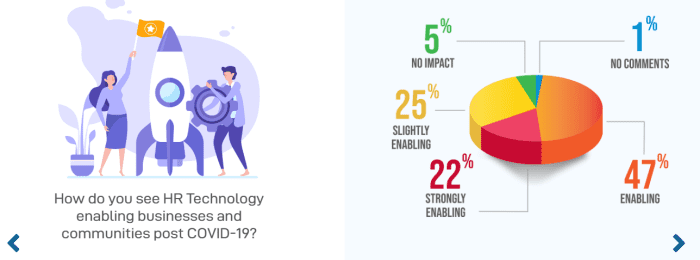
More interestingly, almost 86% of employees have voted that they prefer to work from home for more than 1 day in a week.

What does this foretell for future business models and the new normal of work post-COVID-19? What does it mean for employee experience post-COVID-19? What does this mean for investment in HR tech post-COVID-19? And what kind of opportunity it presents for HR tech firms to tech the s*** out of HR systems?
COVID-19: An inflection point for HRtech
Randeep Singh, COO, HONO.ai, and Ashutosh Sharma, CSMO, HONO.ai, believe that the next six months are an opportunity for HR tech firms as the post-COVID-19 scenario will drastically redefine certain HR technology trends at workplaces. Organizations would look at better self-service and digital automation tools to bolster their employee experience.
Randeep says, “Businesses will become more resilient and for maintaining business continuity, agility and lowering the risk, a fully distributed model will pave the way for future. Businesses will operate with a startup mindset with a renewed focus on accountability. The COVID-19 crisis has accelerated the shift to digital but we will see the game going a bit further by businesses enhancing and expanding their digital channels. The use of advanced analytics to combine new sources of data with their own insights will lead them to make better and faster decisions. There will be a renewed focus on data security making it essential for enterprises to invest in technologies to ensure data and information is not compromised.”
He adds that the human element will define the business core. Businesses will rethink their operating model based on how their people work best. With employees having more flexibility over their schedules as they work remotely, businesses will invest in newer technologies to make communication and collaboration efficient and remote working more functional and productive.
The survey which was done by HONO to get a pulse of larger masses of employees who are using technology to deliver during these difficult times also validates this. With almost 90% of employees giving thumbs up to technology as a critical factor, expect business to catch up on their HR tech game in the next six months.
Randeep adds that the major areas where HR Technology will augment the current ecosystem of HR practices are:
Employee Experience: Organizations will expand the bounds of employee experience, especially to account for personal factors, such as family responsibilities. Well-being & mental health tracking using state of the art HR technology will take a center stage
Employee Engagement: There will be a sharp rise in the adoption of technologies and tools that map employee engagement, feeling, and emotional connection to a company.
Performance Management: A startup mindset will lead to business leaders driving performance in organizations. Task management linked to KPIs, real-time performance check-ins, and reporting of variances in performance will be enabled using evolved HR tech solutions. Data will influence in evaluating productivity and performance evaluations, ratings, rewards.
Mapping & Attracting talent: Effective use of applicant tracking systems through an online application process and virtual interviews will be very rapidly adopted by organizations. Mapping the availability of specialist & gig workforce to support business requirements with minimal disruptions will gain importance.
Skill Development: HR technology will provide tools to develop critical skills of employees that multiply their options and don’t just prepare them for a specific next role. With the use of technology, organizations will re-evaluate which roles need succession plans and bolster the development paths for potential successors.
Besides the uptick in HR Tech, there are many other trends that the survey results point out to.
BCP- The new buzzword in business
While BCP was a hitherto unspoken term, lately it has gained prominence during this time with even smaller organizations stepping into very formalized BCP across stakeholders- be it the IT infrastructure or people or processes.
A very interesting survey data point about when employees expect the situation to go back to normal- with 56% saying it will be 3 months- shows that people are mentally prepared that it will take some time to get back to normal.

Ashutosh points out that this shows businesses how they can categorize the business landscape, what do they need to focus on in terms of employees and stakeholders-such as building client relationships for the future, understanding the business revival challenges, and decoding workplace activation (be it remotely or in offices). Basically, everything that’s necessary for them to include in their business continuity planning.
Collaboration- Your ally against a crisis
One important point highlighted by the survey as to how organizations should prepare for such a future crisis was through enhanced communication. 57% of people voted that enhanced communication would enable organizations to prepare for such future crises.
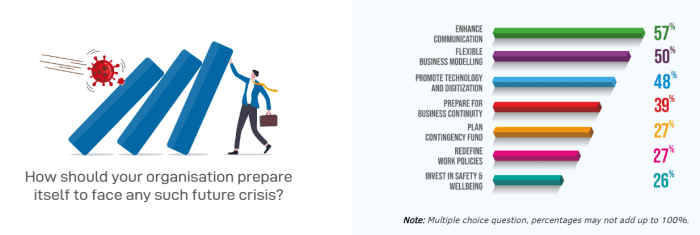
While organizations have gone on overdrive about imparting information in this period, that’s not exactly communication, avers Ashutosh. Communication is all about collaboration, motivation, connect, and continuity. To address this, HONO has launched a unique collaboration platform that takes employees on one social cloud where people can collaborate, work and share their thoughts and everything related to work, policies, events, and connects.
Upgrade, upskill, update
84% of 2,000 geographically spread participants feel the need to upgrade their current skills-especially the technology skills. And the second-highest number of people feel that technology adoption is a very non-negotiable trait now.
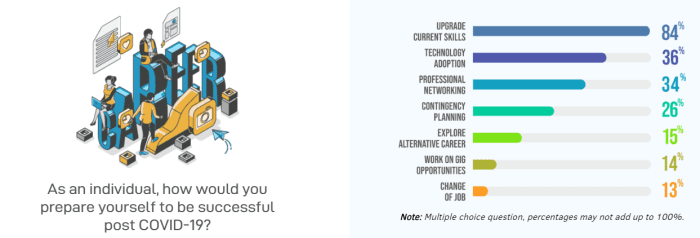
What does this point out to? Expect a lot of movement into the online LMS platforms, online collaboration and engagement platforms. This provides an opportunity for HR tech to not present itself as a very jazz phenomenon but rather a very unique value-creating phenomenon.
“The difference between white collar and blue collar will drastically reduce with technology coming into place.”
Once organizations have given employees self-servicing technology, what they will focus on is keeping them engaged and enhancing their overall experience wherein they feel more connected to the organization to continue and be productive and efficient. What organizations have to adopt is a technology offering wherein employees stay connected to the platform and in turn to the organization- a platform which makes business sense, can measure their productivity, or even create training hours/ surveys/ review meetings.
Hence expect the next six months to be all about the organization’s technology maturity model.
Changing landscape of benefits- When WFH is not a perk but a right
One interesting data point highlighted by the survey is that what employees wanted before is not what they want now. When it comes to benefits, while 74% of employees want internet connectivity, 41% want collaboration tools.
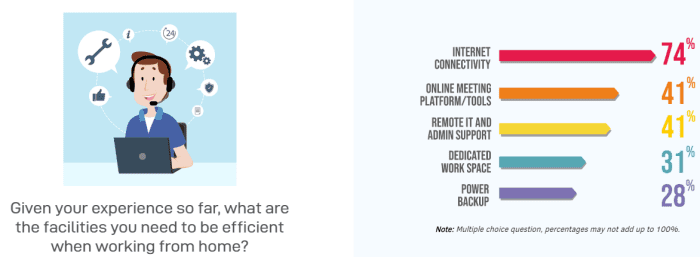
This clearly points out that as employees are talking about WFH no more as a perk or a privilege but as a right, there will be a shift in compensation models and benefits and policy and governance side. Earlier IT companies were preferred as they used to give WFH as a privilege or perk. But today WFH has become a necessity and a new normal. The number of hours spent, the utilization ratios, the productivity ratios, the manpower role-all need to be readdressed accordingly.
Organizations will have to augment the cost and remuneration part associated with it. They will have to quantify the perk as a part of the salary as it is an indirect cost optimization in terms of travel time and morning hours saved.
Hence a WFH allowance is the next compensation denominator.
Similarly, an IT allowance will be the new trend, which firms like EY have already started including in salary packages. Even for white-collar IT, people could start getting in their induction kits a good router, a modem, a good internet connection subscription, and a laptop with a subscription to video conferencing tools ( which will rise for enterprises).
Similarly, all conventional policies will somehow become redundant-in part or total. For instance, how a leave policy will work for a person at home. There is the potential of organizations as well as governments working on leave policy laws. It is possible organizations may want to reduce the number of leaves for employees who are given more WFH as part of their role.
Even statutory compliances act will also undergo change. Health and hygiene and security policies will take a front seat. The new bible of the code of new normal needs to be worked out.
The new model of work- more contracts, fewer careers
With the rise in WFH and gig, expect the complete model of working to go through an overhaul.
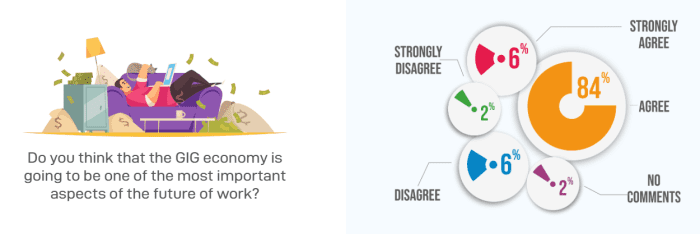
With 84% of people believing that the gig economy is going to be one of the most important aspects of the future of work, expect a decline in the trend of permanent jobs with monthly/yearly continuation. Expect a roster program for even the white-collared, where the number of hours will be proportionately matched to your salary and you may have to pick up an alternate job. Hence all the employment contracts that forbade you from picking another job will have to be reviewed. Ultimately, there will be a lot of permutations that will come up as a part of the rise of the gig economy.
While it is scary and exciting at the same time-with disruption, layoffs, and cash crunch marking this period of change-yet the new normal is an opportunity to create the right HR governance frameworks for our organizations and for the future of work. It is an opportunity for organizations to really ace up their game on the technology maturity curve, for HR tech firms to make the new normal efficient, productive, and connected, and for employees to reimagine their jobs and careers.
















